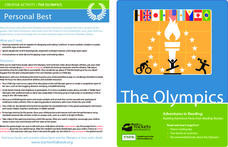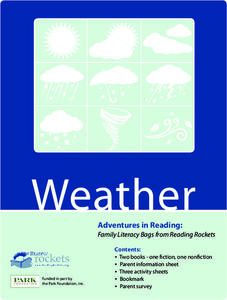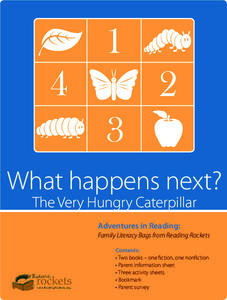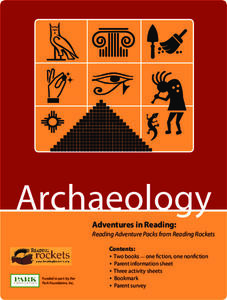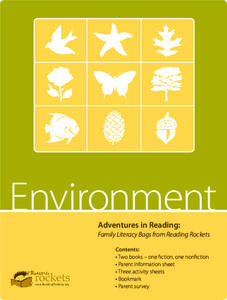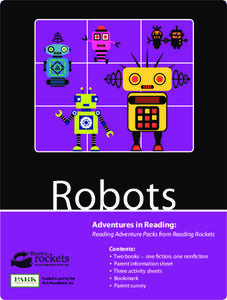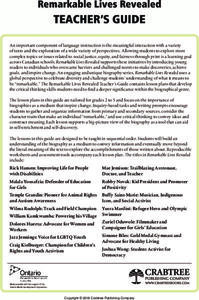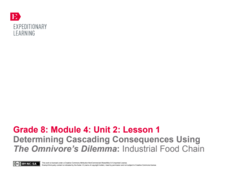PBS
Reading Adventure Pack: The Olympics
The mini Reading Adventure Pack takes a close look at the Olympics. After reading a fiction and nonfiction story, scholars research facts about the host country or a country of their choice participating in the games. The research...
PBS
Reading Adventure Pack: Bees
A Reading Adventure pack explores the busy life of bees. After reading a fiction and nonfiction text, scholars complete three hands-on activities. Participants invent a robot that can do the work of bees, cheers to hardworking bees with...
PBS
Reading Adventure Pack: Birds
A Reading Adventure Pack takes a close look at birds. After reading a fiction and nonfiction book, scholars craft a thaumatrope, begin a birding journal using their sense of sight and hearing, and build a model bird using supplies from...
PBS
Reading Adventure Pack: Weather
A reading adventure pack, featuring a fiction and nonfiction book focuses on the weather. Scholars read Cloudy with a Chance of Meatballs by Judi Barrett and Seymour Simon and then complete three creative activities. Participants craft...
PBS
Reading Adventure Pack: Oceans
Flotsam by David Wiesner and The Magic School Bus on the Ocean Floor by Joanna Cole, illustrated by Bruce Degen, begin a reading adventure pack focusing on oceans. With story listening and thoughtful discussion, scholars complete several...
Mr. Nussbaum
Rainbows
Test scholars' reading comprehension skills with interactive practice. Learners read a short informative text about rainbows, then answer eight multiple-choice questions. A report details their progress after the exercise is complete.
PBS
Reading Adventure Pack: Farms
A Reading Adventure Pack features a fiction and nonfiction text—The Oxcart Man by Donald Hall and illustrated by Barbara Cooney and Farming by Gail Gibbons. Following the readings, scholars make a collage showcasing foods farmed from...
Mr. Nussbaum
Harriet Tubman
Scholars test their reading comprehension skills with a short reading of an informative text about Harriet Tubman. Learners answer eight questions and receive a detailed progress report.
PBS
Reading Adventure Pack: The Snowy Day
Scholars listen to a read-aloud of fiction and nonfiction books, The Snowy Day, written and illustrated by Ezra Jack Keats, and Snow Is Falling, written by Franklyn Branley and illustrated by Holly Keller, then take part in four creative...
PBS
Reading Adventure Pack: What's Next? The Very Hungry Caterpillar
A series of hands-on activities follows a reading of The Very Hungry Caterpillar by Eric Carle. Learners create a paper collage to explore the beginning, middle, and end of days of the week, numbers, and more. They grow a butterfly...
PBS
Reading Adventure Pack: Music
Music is the focus of the reading adventure pack. After reading, pupils complete hands-on activities. Scholars use household items to make shakers and cymbals. They listen to eclectic music by turning on the radio, borrowing music from...
PBS
Reading Adventure Pack: Sleep
A reading adventure pack features two stories—Time to Sleep by Denise Fleming and Animals Don’t Wear Pajamas by Eve Feldman. In response to reading the fiction and nonfiction texts, scholars create a dreamcatcher, discuss hibernation,...
PBS
Reading Adventure Pack: Archaeology
Readings of fiction and nonfiction texts followed by a series of activities put scholars in an archaeologist's shoes. Learners read two texts, Archaeologists Dig for Clues by Kate Duke and The Shipwrecked Sailor: An Egyptian Tale with...
PBS
Reading Adventure Pack: Environment
A fiction and nonfiction text, The Great Kapok Tree: A Tale of the Amazon Rain Forest by Lynne Cherry and I See a Kookaburra! Discovering Animal Habitats Around the World by Steve Jenkins and Robin Page begins a learning experience in...
PBS
Reading Adventure Pack: Robots
Two activities work with a fiction and nonfiction book about robots‚—Robot Dreams by Sara Varon and Robot by Roger Bridgman. Scholars read each story, then build a robot out of found objects, examine robot sensors, and search for...
Crabtree Publishing
Remarkable Lives Revealed
Six lessons make up a unit all about biographies. Scholars read about a remarkable life while taking notes and identifying characteristics of the biographical genre. Readers examine the tale's obstacles, accomplishments, and sequence of...
Encyclopedia Britannica
Candidate Book Report
After reading candidate biographies, class members select one candidate to research. They craft a report on the candidate's book, their position on issues, and the image the candidate wants to project.
Teaching Tolerance
Puppet Show
It's a play, it's a story, it's a puppet show! A lively resource provides academics with a creative outlet to express their views on diversity and social justice. Scholars are responsible for writing, creating, and performing a puppet...
EngageNY
Introducing Historical Context: Narrative of the Life of Frederick Douglass
Is it possible to judge a book by its cover? Scholars analyze and make predictions using various cover images of Narrative of the Life of Frederick Douglass. They then discuss the difference between autobiographies and biographies....
Teaching Tolerance
Community Bulletin Board
A project-based lesson has pupils create a bulletin board to share artwork, nonfiction articles, and messages based on social justice themes. The finished board is displayed in the community to create a place for discussion.
Teaching Tolerance
Community Newsletter
What does it take to develop and publish a newsletter? Young academics create a newsletter with original artwork for their school or community. They explore social justice themes and spread messages of tolerance and inclusion. Scholars...
EngageNY
Adding to Cascading Consequences and Stakeholders: Hunter-Gatherer Food Chain
Could the hunter-gatherer food chain feed everyone in the United States? To consider the question, pupils use their research and add to the Cascading Consequences chart based on Michael Pollan's hunter-gatherer food chain from The...
EngageNY
Local Sustainable Food Chain: Determining Cascading Consequences Using The Omnivore’s Dilemma
What are the consequences of the local, sustainable food chain? Research teams explore the question as they review Michael Pollan's The Omnivore's Dilemma. The teams complete Cascading Consequences charts and then choose research topics...
EngageNY
Determining Cascading Consequences Using The Omnivore’s Dilemma: Industrial Food Chain
Which of Michael Pollan's four food chains from his book The Omnivore's Dilemma would best feed everyone in the United States? Using a thought-provoking resource, scholars learn how to create a Cascading Consequences chart to answer the...


